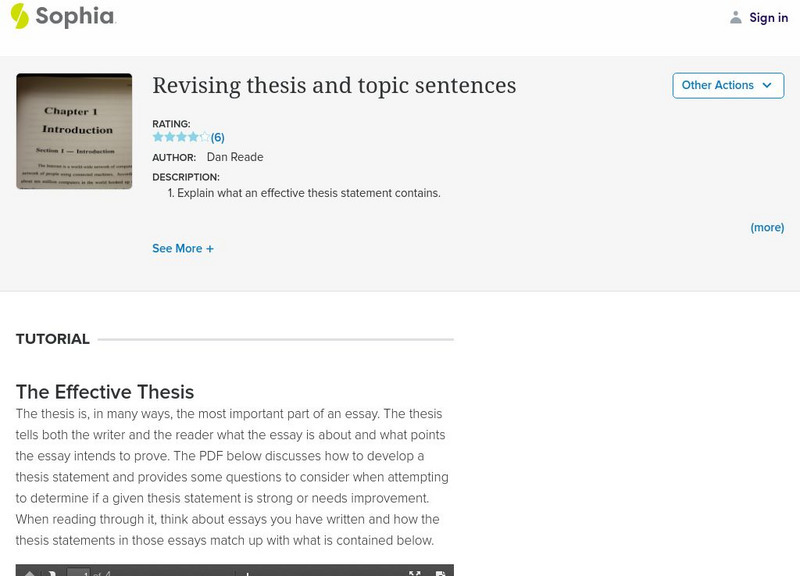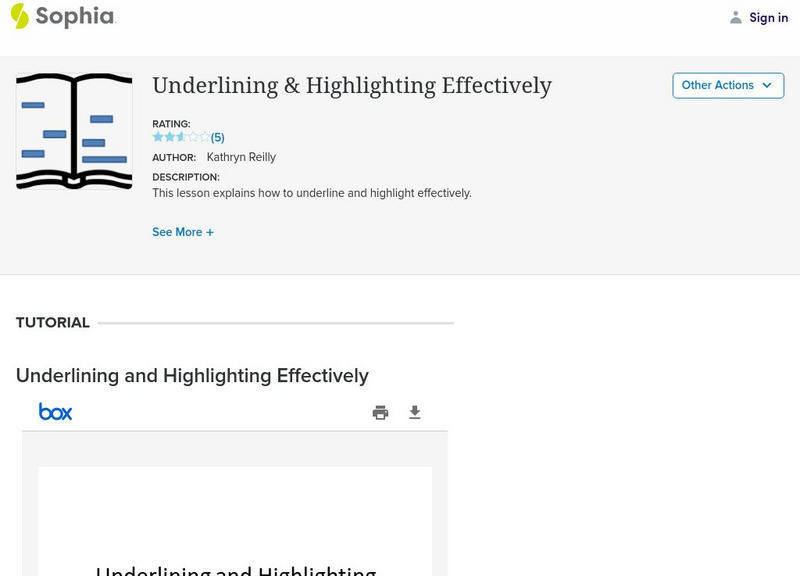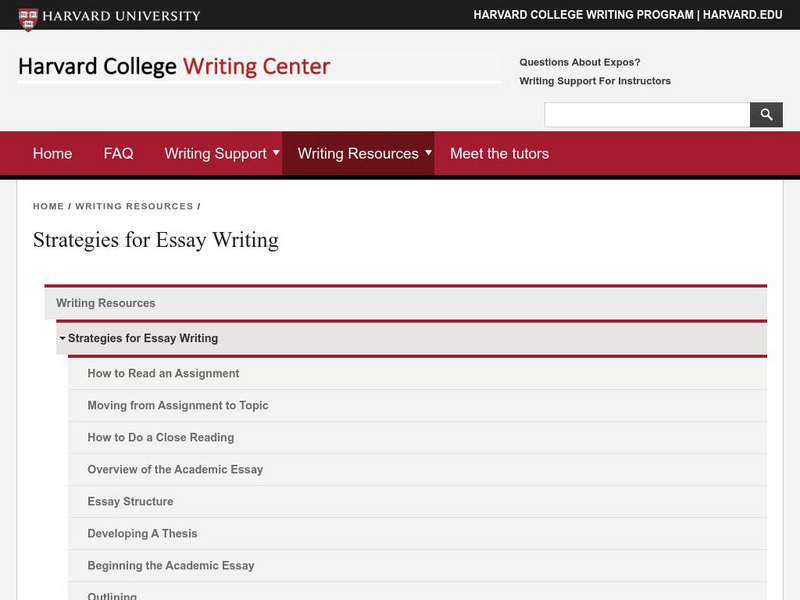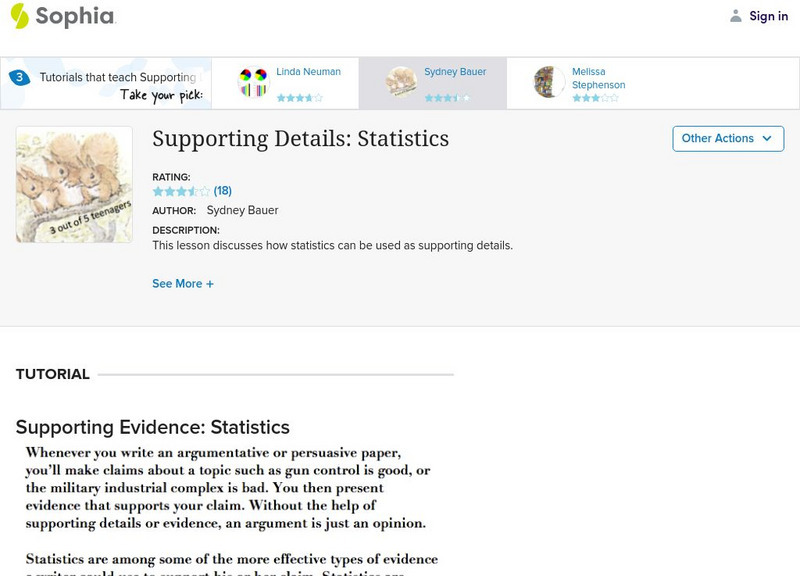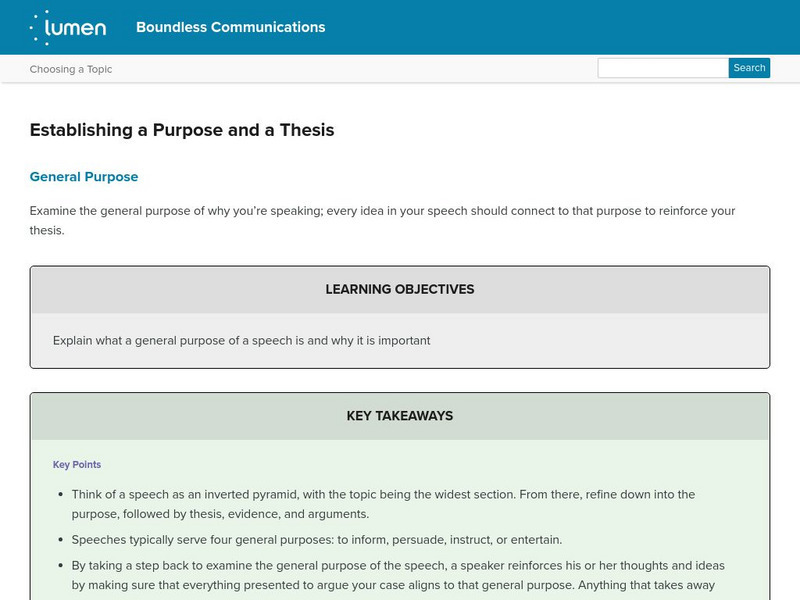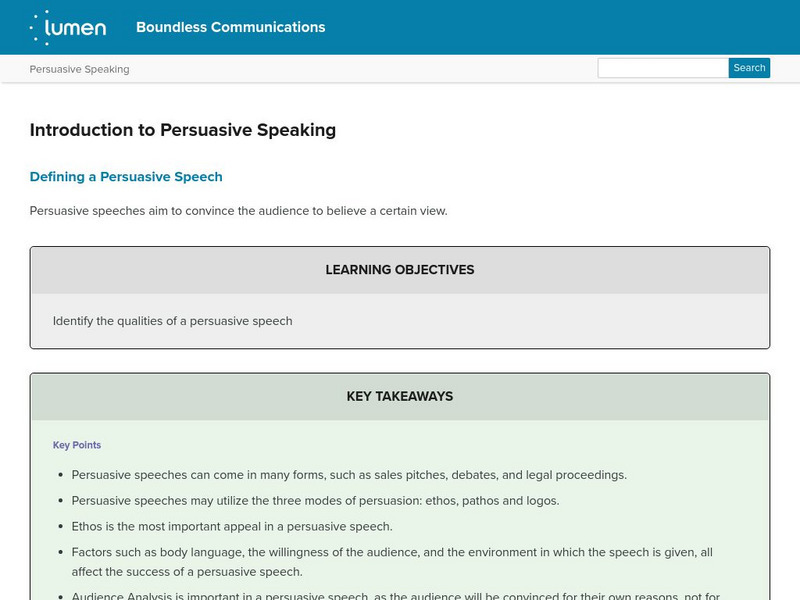Virtual Salt
Virtual Salt: Introduction to Critical Thinking
An introduction to the concept of Critical Thinking examines the true definition and gives examples where it can be used as a constructive force.
CPALMS
Cpalms: Browse and Search Resources
This site shares a collection of expert and peer-vetted teacher resources that are searchable for teachers and students. Searching can be achieved via a subject, grade, audience, and/or type. Curricula standards for the following subjets...
Sophia Learning
Sophia: Outlines
This lesson focuses on outlining; it defines outlining and the two types, topic and sentence. It provides two slideshows: the first focuses on creating the outline including the 4 steps, structure, and importance of flexibility; the...
Sophia Learning
Sophia: Revising Thesis and Topic Sentences
A series of notes and lessons focused on writing thesis statements and topic sentences. The lesson begins with a four-page downloadable PDF containing information about the function and form of a thesis statement as well as how to...
Sophia Learning
Sophia: Thesis Statement
This slideshow lesson focuses on thesis statements. It lists, defines, and provides examples of three types of thesis statements: analytical, expository, and argumentative. It discusses the location of the thesis in the paper and offers...
Sophia Learning
Sophia: Thesis Statement
This slideshow lesson focuses on thesis statements; it defines thesis and its purpose. It explains the three types of thesis statements: analytical, expository, and argumentative; offers questions to ask about the thesis to determine if...
Sophia Learning
Sophia: Thesis Statements
This tutorial focuses on thesis statements; it defines thesis including purpose and location, lists 3 types: analytical, expository, and argumentative and defines and provides examples of each. It lists 4 question to ask to determine if...
Sophia Learning
Sophia: Underlining and Highlighting Effectively
This slideshow focuses on underlining and highlighting effectively by showing what ineffective underlining and highlighting looks like and explaining the problems with it; this is followed by showing what effective underlining and...
Savvas Learning
Pearson Longman: Main Points, Support Points, and Specific Details
Part of the Pearson Longman series entitled "Sentence Resources for Writers", this site assesses the high school student's ability to identify main points and develop specific details and support points. Includes ten multiple choice and...
University of North Carolina
University of North Carolina: Writing Center: Handouts: Evidence
What kinds of evidence best support the points you make in a paper? Where can you find the evidence you need? This handout answers all these questions and more, including the difference between primary and secondary sources. You'll also...
Harvard University
Harvard University: Strategies for Essay Writing
This website provides a series of links to detailed information about each segment of how to write an academic essay from how to read the assignment to the final edits. Use the links to the right. W.9-10.1a claims/intro/org, W.9-10.2a...
Texas Education Agency
Texas Gateway: Revising the Persuasive Essay: Counterarguments Based on Evidence
[Accessible by TX Educators. Free Registration/Login Required] You will learn strategies for evaluating and revising counter-arguments that anticipate objections in an essay.
Texas Education Agency
Texas Gateway: Revision for Relevant Evidence and Well Chosen Details
[Accessible by TX Educators. Free Registration/Login Required] You will learn strategies for evaluating and revising an essay so that it contains relevant evidence and well-chosen details.
Online Writing Lab at Purdue University
Purdue University Owl: Analyzing Your Primary Data
This entry focuses on analyzing primary data including interviews, surveys, and observations. It also warns against over-generalization and explains the advantages of the triangulation of data.
Online Writing Lab at Purdue University
Purdue University Owl: Observing
This entry focuses on observation as a primary research tool. It covers topics including participation alters the outcome, observation and interpretation are separate, note-taking vs recording, and paying attention to details.
National Science Teachers Association
Nsta: Science & Engineering Practices: Obtaining, Evaluating, Communication
This site from NSTA includes a progression of the Science and Engineering Practice for obtaining, evaluating, and communicating information. In addition, thereare performance expectations that make use science and engineering practices.
Other
Integrated Public Use Microdata Series
Census data is available here for extraction in various configurations--provides a resource for math and social studies collaboration analyzing and sorting data.
Other
Fqs: Debate "Quality of Qualitative Research"
This link provides information about forming you debate speech. It foucuses on the quality of the quantity of your speech.
ReadWriteThink
Read Write Think: I Search Chart
A printable inquiry search graphic organizer to help students organize questions and sub questions while working through the research process. Directions on how to use this type of graphic organize as well as lists of teaching ideas and...
Sophia Learning
Sophia: Supporting Details: Statistics
This lesson focuses on using statistics as supporting details. It explains why statistics make powerful supporting details, however, these can be skewed to show different outcomes. It suggests looking carefully when using statistics to...
Lumen Learning
Lumen: Boundless Communications: Establishing a Purpose and a Thesis
This lesson focuses on establishing the purpose and thesis of your speech. It includes information about both a general and specific purpose of the speech and developing a thesis statement that clearly articulates the purpose and main...
Lumen Learning
Lumen: Boundless Communications: Introduction to Persuasive Speaking
This lesson focuses on persuasive speaking including identifying the qualities, components, goals, and ethics of persuasive speaking.
Lumen Learning
Lumen: Boundless Communications: Principles of Organization
This lesson focuses on the importance of organizing your speech including critically thinking about the contents of the speech, the components of the speech, the patterns of organization to fit the different types of speeches, and...
Lumen Learning
Lumen: Boundless Communications: Introduction
This lesson focuses on the introduction to your speech. It includes the role of the introduction, strategies for the opening, getting attention and interest, establishing credibility, self-presentation, and introducing the topic, thesis,...





